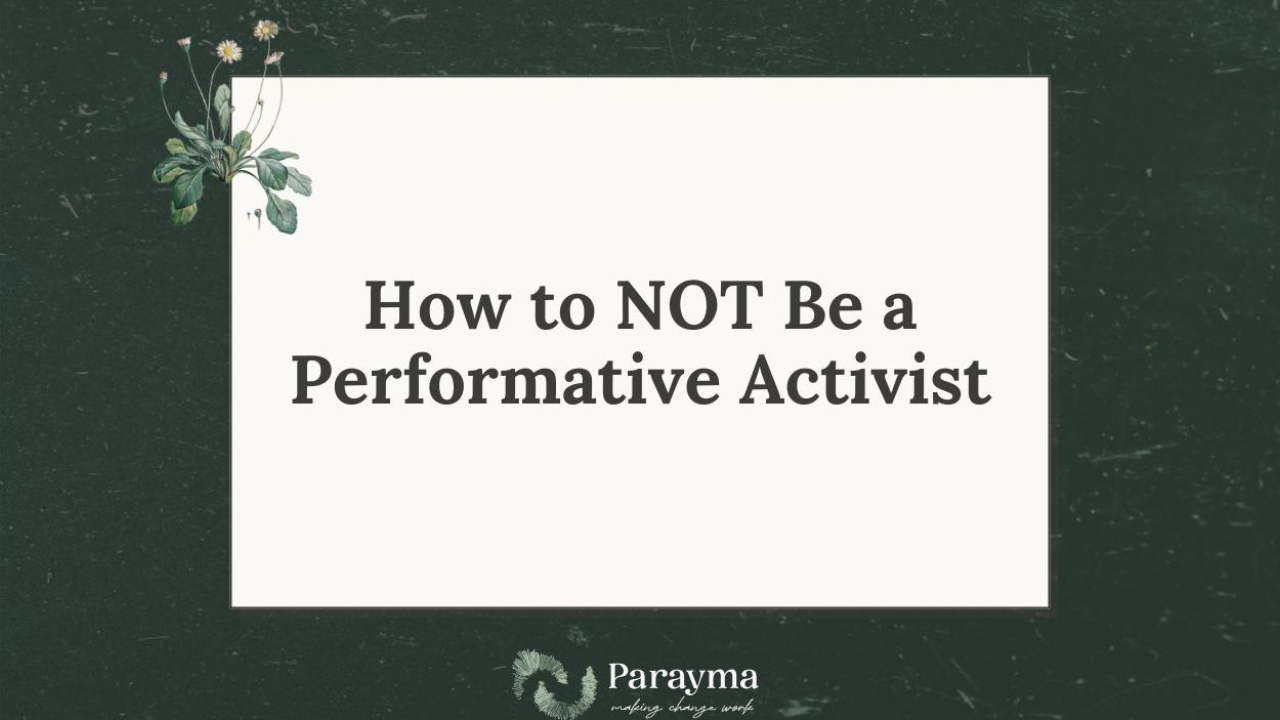How to NOT Be a Performative Activist (in 2026)
Sep 30, 2025
Performative activism (sometimes called slacktivism) is expressions of support for social causes that are shallow, symbolic, or primarily aimed to signal virtue rather than to produce real change. It’s when someone posts about a cause when it's trending, but doesn’t follow through, truly care, or embody those values behind the scenes.
Often this looks like changing a profile picture, posting a hashtag, or sharing an infographic without doing any deeper internal work, research, or engaging in any tangible action. It’s not about perfection (no one expects you to be flawless!), but about the gap between what is shown in public and what is practiced privately.
In that sense, performative activism is activism for the self - to feel good, appear virtuous, or gain social capital (i.e. to “look good” publicly) - rather than activism for activism’s sake. It’s not about resisting caring; it happens when care is shallow, when cost is zero, and when consistency is missing.
Unfortunately, corporations are notorious for engaging in performative action. For example, when they annually turn their logo into an LGBTQ+-friendly one, and then don’t take any action whatsoever to support, listen to, or engage with LGBTQ+ rights. They simply want to appear LGBTQ+ friendly, without actually being allies - this benefits their bottom line: profits.
Why Do People Do Performative Activism?
Understanding the motivations behind performative activism helps us move past blaming into clarity and change. While we can embody understanding and compassion, we should stay mindful of those who engage in performative activism and, based on that, decide how we ourselves want to engage with those folks.
-
Desire for social approval or validation
Posting about trending causes makes one look “on the right side”, improving reputation, social standing, or brand. Many act only when the spotlight is on because it benefits them in some way. Only engaging in activism when it benefits you in some way means you don’t actually care and are only doing it for self-serving reasons.
-
Emotional discomfort & wanting to “do something easy”
In the face of overwhelming suffering, a quick repost or hashtag feels like some action - less risky than deeper engagement. The easier route can seduce people into surface-level responses and “action”. However, expressing your support for a cause is only the first step. No one expects you to be an activist overnight, but taking even a small step of genuine action shows you’re not being performative.
-
Disconnect between knowledge & commitment
Many people are unaware of how deeply systems can operate. They may express their support for a cause without actually understanding the issue, the context, or listening to affected communities. People who don’t have a strong connection or understanding of an issue or a cause are inherently more likely to engage in performative activism. You don’t know what you don’t know. That’s why it’s so important to educate yourself.
-
Privilege & insulation
Those with privilege are often shielded from harsh consequences and big risks. This safety can allow performative acts that cost little to the individual, even when called out for performative activism. You’ll often see people get called out or “cancelled” for performative activism, and then see them successfully re-emerge six months later when everyone has forgotten about it.
-
Corporate or institutional strategy
Many organizations engage in woke‑washing or PR activism: posting support online while their internal practices remain unchanged or even harmful. They face immense public and economic pressure to showcase where they stand on specific issues and this can lead to disingenuous stances.
So, often performativity arises from a mix of ego, comfort, social pressure, lack of understanding, and institutional hypocrisy. It’s a complicated issue!
The Rise of Corporate Woke Washing
In recent years, corporations have increasingly engaged in symbolic activism to align with progressive values - without the substance to back it up. This is often called “woke-washing.” The pattern is familiar: rebranding, campaign imagery, cause marketing, logos modified for social months, but few structural changes in workplace practices, supply chains, company culture, or governance.
Remember that Pepsi x Kendall Jenner ad that caused an uproar (rightfully so) because they were trying to align themselves with social movement protests?
Corporations miss the mark when their activism isn’t backed up by their actions. Yes, it’s great to express support for causes, but it’s performative when there’s no meaningful action (even something small).
The danger is twofold:
1. Dilution of movements
When big actors engage superficially, the voices of grassroots, marginalized communities can be overshadowed and ignored. Performative acts can appropriate attention, space, and legitimacy - simply because their voices are more covered by the media.
2. Erosion of trust
People become cynical and disillusioned when repeated promises turn out to be empty gestures. Performative activism deeply hurts trust, credibility, care, and support. Then when real work emerges, it’s much harder to mobilize support. That’s why it’s so important to get it right from the beginning. Companies like Patagonia are good examples of that.
True corporate responsibility would require auditing their own systems, aligning values with practice, redistributing power, paying for repair, and diversifying leadership, among other actions. Real activism, especially on a grand scale in a bureaucratic organization, can of course be very difficult. But that doesn’t excuse performative activism - there are always aligned actions that can be done.
The Appeal of Performance on Social Media
Social media amplifies performativity because:
-
Visibility is easy
A single post is fast, free or cheap, and wide-reaching. It creates an impression of engagement without any real cost.
-
Audience feedback loops
Likes, shares, and comments reward symbolic expressions and reinforce self-worth through external validation. As social creatures, we enjoy receiving support and praise from others.
-
Narrative pressure
In trending moments, silence can carry risk. Many feel pressured to post, even if prematurely or superficially, to avoid being seen as complicit.
-
Echo chambers & uncritical virality
When infographics and slogans spread like wildfire, nuance often gets lost. Remember the telephone game you used to play as a kid? It’s a similar idea where, after so many iterations, the original meaning and words get lost. Many share online because it feels righteous, while not always being accurately or comprehensively informed.
-
Branding & identity crafting
Many treat activism as part of identity branding: this is who I am. The danger is that moral identity becomes performative posturing - where expressing one’s identity gets confused with real activism.
How to Not Be a Performative Activist: Be Sincere & Authentic
To avoid performative activism and showing up inauthentically, below are practices to help you shift from surface-level action toward grounded, authentic action:
Mean What You Say
Step one: don’t speak publicly unless you’re ready to act, to reflect, and to be accountable. If you post or speak out, let your words carry responsibility. Know that your statements create expectations - of your own consistency and follow-through.
This means pausing rather than reflexively joining viral trends. It means asking: If I post this, will I uphold it when challenged? If yes, proceed. If not, sit with the impulse until your commitment is real (or don’t share anything at all if your commitment will never be real - every cause isn’t for everyone).
Because performative activism is often empty words that sound nice. Authentic activism is alignment between voice, vision, and action.
Listen More Than You Speak
Authentic activism begins with listening, especially to communities most impacted. Don’t amplify your voice first - listen, support, co-design, and follow their lead. They know best.
Listening helps you understand context, avoid causing harm, step in where needed, and avoid misrepresenting narratives. If an opportunity arises to uplift voices, do so genuinely (with compensation, inclusion, and respect), rather than overshadowing and taking center stage.
Keep Learning (Even When It Feels Uncomfortable)
You will make mistakes. You will discover your blindspots. Your nervous systems may even feel triggered at times. That is part of evolving and becoming the version of you that you want to be. What matters is that you keep going. Read critical texts, engage with voices you disagree with, and lean into discomfort - that’s where the biggest learning tends to happen.
Whether it’s documentaries, books, podcasts, YouTube videos, or simply showing up to community gatherings, I recommend taking small steps to educate yourself. Systems change (i.e. taking action to change social systems) isn’t easy. To walk an activist’s path, you need to be hungry for knowledge and humble through the process. It’s ok that you don’t know much right now - you’re already ahead of someone who’s not even self-aware.
Keep Intersectionality in Mind
No cause exists in isolation. Racism, colonialism, patriarchy, ecological destruction, pollution, etc. are all entangled. When a good changeworker practices intersectionality, they consider how oppressions interlock and how different struggles intersect and connect.
This means resisting single-issue activism that erases voices, and instead centering marginalized leadership and ensuring inclusion in your activist strategies. It also means when you fight climate change, you consider justice and equity; when you act for gender, you account for race, class, disability, etc.
Show Up Sincerely on Social Media
Your online presence is an extension of your values. Some helpful guidelines:
- Use your platform to uplift others more than yourself
- Show behind-the-scenes (not just highlight reels)
- Admit uncertainty, gaps, and what you're learning
- Anchor posts in references, resources, and calls to action (not just slogans or hashtags)
- Avoid virtue-signaling phrasing like “I did my part” without transparency of what your “part” was
Social media doesn’t have to be shallow, but it requires discipline and integrity to keep it real. Even when it’s hard. In the end, it’ll also benefit you because people love integrity, real passion, and human connection.
Prioritize Your Self-Care
You can’t sustain activism if you’re exhausted or burned out. Rest, boundaries, creative nourishment, nature, and engaging in community are integral to showing up as a genuine activist.
Performative activism often springs from guilt and pressure; authentic activism springs from rooted capacity. Take care of your physical and mental health so you don’t collapse under your own good intentions. Trust me, I’ve been there and I don’t recommend it.
If you have no idea where to start (and no, I don’t mean bubble baths and candles), check out our online self-paced program Changework Compass or our online art-based workshops both designed to help you pour into your cup in a sustainable way.
Work Together
Activism done solo is limited and energy-intensive. Explore collaborating with others, building community, or joining existing movements. Don’t reinvent alone. Co-create strategies, combine voices, and amplify marginalized leadership.
Collective wisdom and shared accountability reduce performative risk. I’ve seen some of the best systems change activist work come from people who joined forces and pushed forward together - tapping into their numbers, care, and solidarity.
Do Things That No One Will Ever Know
Part of sincerity is doing the work away from the spotlight. Helping quietly, organizing locally, and listening when there’s no one to watch you. Not all acts of change should be visible. Sometimes your most important work happens behind the scenes.
Of course, there’s a balance here. For example, some folks film themselves handing out care packages to unhoused people on the street. These videos tend to get a lot of views and engagement, which can lead to monetization on the social media platform. This is controversial because good is obviously being done, but is it performative or not? The difference, in my opinion, is that the non-performative people are also heavily engaging in their cause when the camera is off. If they’re funding the care packages, for example, through social media monetization, then perhaps there’s an argument there that doing good publicly can be good.
Don’t Be The Expert
You’re not an omnipresent, all-knowing being. Don’t posture yourself as the authority on justice, for example, if you aren’t willing to hold humility, feedback, critique, and unlearning. When you see or quote, give credit where credit is due. When you don’t know, say you don’t know. When others lead, follow. Resist speaking over those you aim to serve.
It’s ok that you don’t know everything there is to know about any one cause or social issue. Even the people you look up to always have learning to do. It doesn’t matter who knows the most - it matters more the care and activist engagement you commit to.
Embody Your Values Year‑Round
Activism is not seasonal. It’s not just when injustice is trending or because there’s a holiday. Don’t just re-post an image or slogan to express where you stand and then never talk about it again. To avoid being performative, your values must show up in your everyday choices: consumption, relationships, voting, use of resources, lifestyle, and media consumption. It’s all connected. How we live everyday is guided by our genuine, deeply-held values.
Consistency across private and public life is what builds trust, credibility, and integrity.
How to Spot Performative Activism & Allyship
Here are some red flags and tests:
-
Post when it costs nothing but stay silent when it costs something
If someone speaks up only when trending, but hides when challenge arises, that’s suspect.
-
No accompanying action or follow‑up
If a post or expression of support isn’t followed by internal work, accountability, structural change, donations, or labor, ask yourself why they’re not showing up in that way.
-
Isolated statements disconnected from everyday choices
If someone tweets about justice but practices behaviors that contradict it (overconsumption or harmful habits), that gap suggests performativity.
-
Lack of humility or unwillingness to be educated
Performative activism often resists critique, feedback, and accountability. That’s a tell-tale sign.
-
Having a dominating voice rather than amplifying others
If someone always speaks about issues they’re not part of without lifting voices from communities they claim to support, it’s likely performative.
-
Use of slogans over substance
Claims like “I stand for X” without explaining how they engage or support that cause in real-life may be shallow. Take statements like that with a grain of salt. Is there real substance behind their support?
-
Activism tied to personal branding, visibility, or career moves
If activism becomes a stepping stone, or a personal brand component rather than a grounded, sincere commitment, watch for misalignment and lack of action.
Want to show up authentically but need more guidance? Check out our fellowship for active changeworkers or 1:1 mentorship for all stages of activism.
Applications now open
The Harvest Lab
8-week guided journey for changeworkers, thought leaders, educators, and visionaries ready to shape their lived experience into aligned offerings — and to do it in a way that feels regenerative, not depleting.
Subscribe to The Changework Journal
Get first access to new offers, free or discounted tickets to events Nora speaks at, exclusive access to funding opportunities we source from our network (not shared anywhere else on our channels), and more!



